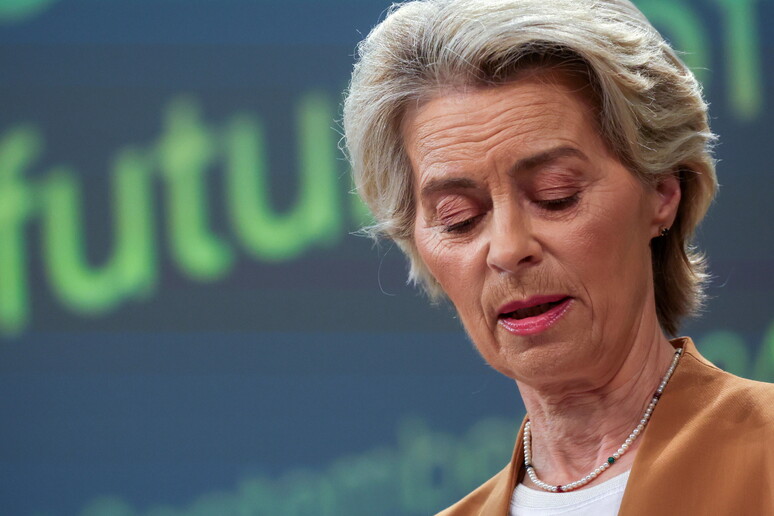The President of the European
Commission, Ursula von der Leyen, has set the goal of achieving
gender balance in the next European Commission. Equal numbers of
men and women should hold the top jobs. But national governments
are not playing ball.
European Commission President Ursula von der Leyen's plans for
gender balance in her new team of commissioners are in danger of
failing due to a lack of cooperation from member states. To
achieve gender balance in the Commission, von der Leyen asked
the EU's national governments to nominate both a man and a woman
candidate until the end of August. The goal of parity is not new
- already during her first term of office five years ago, Ursula
von der Leyen was guided by it when selecting commissioners.
Back then with more success.
This time several states ignored von der Leyen's request.
Significantly, more than half of the governments had only
proposed one male candidate for the College of Commissioners,
explaining this, for example, with their nominations in the
past.
The final balance reflects that 16 countries have proposed male
candidates, ten have proposed women, and only one, Bulgaria, has
complied with von der Leyen's wish and proposed a man and a
woman, as the EU Commission President had initially requested.
The number of women was bolstered Monday after Romanian media
reported that Prime Minister Marcel Ciolacu had switched his
pick from a male candidate to MEP Roxana Minzatu.
The College of Commissioners will consist of 27 members, with
each member state being represented by a commissioner. If there
are no further changes to the nominations, around two thirds of
the positions could be held by men. The outgoing college was
composed of 15 men and twelve women.
EU commissioners conduct the work of around 32,000 employees of
the EU Commission and are assigned responsibility for specific
policy areas by the president. The EU Commission is responsible
for proposing new EU laws and monitoring compliance with the
European treaties. The selection of commissioners for the new EU
Commission is the last major step in filling top political
positions after the European elections in June.
"Old boys' club" lineup for EU Commission
The European Women's Lobby (EWL), an umbrella group working
toward gender equality in the bloc, said the situation was
indicative of an "old boys' club" mindset and called it "beyond
embarrassing".
"If member states truly believe only men are fit for these roles
or that there are no qualified women in their countries, they're
not just out of touch - they're delusional," said the group's
spokesperson, Mirta Baselovic.
Lina Gálvez Muñoz, chair of the European Parliament committee on
gender equality, said the numbers suggested a clear lack of
"political will" from member states that sent a "very bad
signal, especially to younger women and girls".
At the root of the situation is a power play between von der
Leyen and European capitals that may well back goals like gender
parity on paper but, in practice, resist having their hands tied
in any way.
"As member states, we expect von der Leyen to strive for gender
parity," said an EU diplomat, speaking on condition of anonymity
to the French press agency AFP. "At the same time, we also
believe that it is up to us to propose the commissioner we
prefer. (…) Unfortunately, those two desires don't seem to align
this time around."
"I believe that this story shows how, unfortunately, gender
equality in politics has not yet been assimilated," a source
close to the European Commission President told the Italian
press agency ANSA.
Is there a risk of reputational damage?
Italian EU law expert Alberto Alemanno recently warned that a
male-dominated college would weaken the authority of the EU
Commission's President.
He called on von der Leyen to make her dissatisfaction clear to
the national capitals and ask them to draw up a new list of
candidates as quickly as possible in order to limit the damage
to her own reputation and that of the EU as a whole.
According to Alemanno, this could also lead to weak male
commissioner candidates not receiving the necessary approval in
the European Parliament. This would mean that the national
governments that nominated them would have to appoint a new
candidate.
What's coming next?
With all the names in hand, European Commission President Ursula
von der Leyen now has to distribute all the portfolios, both in
terms of rank (vice-presidencies) and the subjects for which
each commissioner will be responsible, with areas such as the
economy, industry and defence among the most desired by the
candidates. Giving female candidates more important portfolios
and vice-presidencies could be a way to compensate for the
numerical gender imbalance.
Ursula von der Leyen has already made her first choices for her
top team. German newspaper Die Welt reported on Tuesday that a
right-wing populist, Raffaele Fitto, a member of Prime Minister
Giorgia Meloni's Fratelli d'Italia party, will obtain a top
position in the European Commission and is expected to be
appointed executive vice-president in charge of the economy and
post-pandemic recovery.
France's Thierry Breton will take charge of industry and
strategic autonomy. Spain's Teresa Ribera has been chosen for a
"transition" portfolio that will include ecology and digital
affairs. Slovakia's Maroš Šefčovič will stay on as commissioner
for inter-institutional affairs, while Czech industry and trade
minister Jozef Síkela will be in charge of energy. Poland's
Piotr Serafin will be responsible for budgetary affairs.
ALL RIGHTS RESERVED © Copyright ANSA











